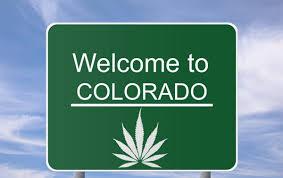The feds may not be interested in making operations easier for marijuana growers or sellers, or even in reducing their risk of being robbed.
But they are interested in collecting more taxes.
That may be the industry’s best hope of getting permission from Washington to use regular banking facilities.
There’s a two-pronged effort in Colorado to make it possible for the freshly legalized pot business to operate like every other enterprise.
One employs the traditional method: Get Congress to change the law. U.S. Rep. Ed Perlmutter, D-Colorado, introduced a bill in July that would prohibit federal regulators from charging banks with drug racketeering and cutting off their deposit insurance if they let marijuana businesses open accounts.
![]() The bill is considered to have little chance, since he’s a Democrat in a highly partisan, Republican-controlled House. But he does have two GOP cosponsors, Reps. Dana Rohrabacher of California and Mike Coffman of Colorado. “We’re always optimistic,” said Noah Marine, a legislative aide to Perlmutter. “We’ve been talking to the chairman of the House Financial Services Committee, trying to at least get a hearing,” he said. “We’ve been gaining momentum slowly, but it’s an uphill climb.”
The bill is considered to have little chance, since he’s a Democrat in a highly partisan, Republican-controlled House. But he does have two GOP cosponsors, Reps. Dana Rohrabacher of California and Mike Coffman of Colorado. “We’re always optimistic,” said Noah Marine, a legislative aide to Perlmutter. “We’ve been talking to the chairman of the House Financial Services Committee, trying to at least get a hearing,” he said. “We’ve been gaining momentum slowly, but it’s an uphill climb.”
The other tactic would employ a popular new Obama Administration technique: Skip all the congressional foofaraw and simply change the law administratively, by fiat. That’s how ObamaCare’s employer mandate was delayed by a year; how 1,200 companies got waivers from ObamaCare, and how Congress managed to continue getting health care subsidies for members and staffers to which they would not be entitled under the new law.
Perlmutter has tried that tack, too. He and Rep. Denny Heck of Washington, the only other state that’s legalized recreational marijuana, co-wrote a letter to the Federal Reserve, the Treasury Department, the FDIC and other federal agencies noting that marijuana businesses are “forced to operate as cash-only enterprises, inviting crime such as robbery and tax evasion and adding to the burden of setting up a legitimate small business.”
Tax evasion. That should get their attention. It’s always easier to collect taxes from businesses that use the banking system.
They suggested that bank regulators “issue a memorandum providing guidance to regulated banks, credit unions and other financial services providers eliminating any further uncertainty and ensuring state and local governments have access to an effective and safe regulatory regime.”
That’s an oblique way of saying they should make it clear to banks that they can take marijuana accounts without fear of reprisals.
Marine said the congressmen have not yet heard back from anybody, but they hope that means the recipients are at least talking to each other. “I’d rather have a thoughtful, substantive response than a blanket thank-you letter,” he said.
Meanwhile, Denver’s city auditor, Dennis Gallagher, wrote a letter to U.S.Attorney General Eric Holder earlier this month noting that “businesses which can only operate on a cash basis are not only a magnet for crime and criminal activity — a serious threat to public safety — but are virtually unaccountable from a regulatory or taxation standpoint.”
Previously established medical marijuana businesses already make transactions worth “millions of dollars annually” in Denver, he wrote. “These amounts are likely to increase exponentially next year when non-medical retails sales begin.”
Gallagher took note of a recent Justice Department memo stating that it has decided not to crack down on states that have legalized pot, even though pot is still illegal under federal law. “However, while that is helpful, it does not directly address the banking problem,” he wrote.
Gallagher said it is “critical” that federal agencies revise their regulations and “allow both federally-chartered as well as state-chartered financial institutions to enter into banking relationships” with regulated marijuana businesses.
The city has not received a response from Holder, said Gallagher aide Denis Berckefeldt.
Since 20 states have legalized medical marijuana already, “the train has left the station,” Berckefeldt said. Administrators can make a short-term fix on the banking issue but “the federal government better figure out how to deal with it in the long run rather than the short run.”
It isn’t a strictly partisan issue since libertarians, liberal Democrats “and even Tea Party Republicans” are realizing the “war on drugs” has failed.
Berckefeldt admits it’s possible that some marijuana businesses are banking illegally under pseudonyms, or laundering cash through other businesses. But that’s risky for everybody.
Meanwhile, bizarre cash transactions are taking place. The City and County of Denver ‘s treasury department revealed that it recently was given $64,000 in cash to cover sales tax receipts for a single pot shop. But that covered taxes for a six-month period, five of which were delinquent. The largest payment for a single month was $18,000.
A treasury spokesman said only 20 percent of pot shop taxes are paid in cash. The rest are paid by check or, more likely, money orders. Which means riskily taking large amounts of cash to the supermarkets that issue them.
It’s time to let marijuana businesses use banks like everybody else.
Longtime Rocky Mountain News political columnist Peter Blake now writes Thursdays for CompleteColorado.com. Contact him at pblake0705@comcast.net You may re-publish his work at no charge and without further permission; please give full credit to Peter Blake and www.CompleteColorado.com


